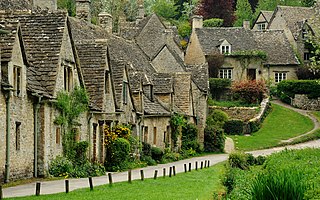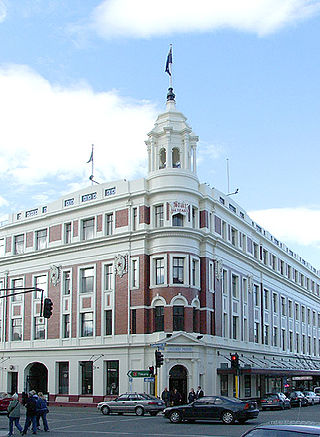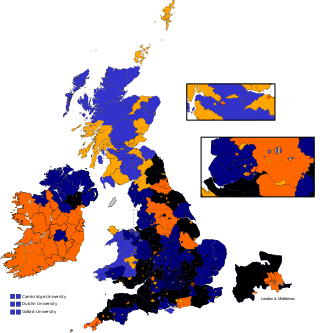Related Research Articles

Gloucestershire is a ceremonial county in South West England. It is bordered by Herefordshire to the north-west, Worcestershire to the north, Warwickshire to the north-east, Oxfordshire to the east, Wiltshire to the south, Bristol and Somerset to the south-west, and the Welsh county of Monmouthshire to the west. The city of Gloucester is the largest settlement and the county town.

Avon was a non-metropolitan and ceremonial county in the west of England that existed between 1974 and 1996. The county was named after the River Avon, which flows through the area. It was formed from the county boroughs of Bristol and Bath, together with parts of the administrative counties of Gloucestershire and Somerset.

Somerton is a town and civil parish in the English county of Somerset. It gave its name to the county and was briefly, around the start of the 14th century, the county town, and around 900 was possibly the capital of Wessex. It has held a weekly market since the Middle Ages, and the main square with its market cross is today popular with visitors. Situated on the River Cary, approximately 8.8 miles (14.2 km) north-west of Yeovil, Somerton has its own town council serving a population of 4,697 as of 2011.

The Otago Daily Times (ODT) is a newspaper published by Allied Press Ltd in Dunedin, New Zealand. The ODT is one of the country's four main daily newspapers, serving the southern South Island with a circulation of around 26,000 and a combined print and digital annual audience of 304,000. Founded in 1861 it is New Zealand's oldest surviving daily newspaper – Christchurch's The Press, six months older, was a weekly paper until March 1863.

Cheltenham Spa railway station serves the town of Cheltenham in Gloucestershire, England. Situated on the Bristol-Birmingham main line, it is managed by Great Western Railway, despite most services being operated by CrossCountry which does not manage any stations. It is located about one mile from the town centre. The official name of the town is simply Cheltenham but, when the station was renamed in 1925, the London, Midland and Scottish Railway chose to add Spa to the station name. It is a key regional interchange and is the fifth busiest railway station in South West England.
Kingston upon Hull, often simply referred to as Hull, was a parliamentary constituency in Yorkshire, electing two members of parliament to the House of Commons of the Parliament of the United Kingdom, from 1305 until 1885. Its MPs included the anti-slavery campaigner, William Wilberforce, and the poet Andrew Marvell.

East Somerset was the name of a parliamentary constituency in Somerset, represented in the House of Commons of the Parliament of the United Kingdom between 1832 and 1918.
The Gloucestershire Echo is a local weekly newspaper based in Gloucester, England. Published every Thursday, it covers the areas of Bishops Cleeve, Cheltenham, Moreton-in-Marsh, Northleach, Stow-on-the-Wold and Tewkesbury. The newspaper is headquartered at Gloucester Quays.
The Leeds Mercury was a newspaper published in Leeds, West Yorkshire, England. It was published from 1718 to 1755 and again from 1767. Initially it consisted of 12 pages and cost three halfpennies. In 1794 it had a circulation of about 3,000 copies, and in 1797 the cost rose to sixpence because of increased stamp duty. It appeared weekly until 1855, then three times a week until 1861 when stamp duty was abolished and it became a daily paper costing one penny.

The Bunyip is a weekly newspaper, first printed on 5 September 1863, and originally published and printed in Gawler, South Australia. Its distribution area includes the Gawler, Barossa, Light, Playford, and Adelaide Plains areas. Along with The Murray Pioneer, The River News, and The Loxton News,The Bunyip was now owned by the Taylor Group of Newspapers and printed in Renmark.
The history of journalism in the United Kingdom includes the gathering and transmitting of news, spans the growth of technology and trade, marked by the advent of specialised techniques for gathering and disseminating information on a regular basis. In the analysis of historians, it involves the steady increase of the scope of news available to us and the speed with which it is transmitted.
The 1887–88 season was the fifth to be played by the team that are now known as Bristol Rovers, and their fourth playing under the name Eastville Rovers. It marked a major change in the direction of football in Gloucestershire as a County Football Association was established, enabling a formal cup competition to be played in the area for the first time.
The 1888–89 season was the sixth to be played by the team that is now known as Bristol Rovers, and their fifth playing under the name Eastville Rovers. It was significant as being the first season in which the club won a trophy, taking the Gloucestershire Cup title in just the second year of the tournament's existence.
The 1889–90 season was the seventh to be played by the team that are now known as Bristol Rovers, and their sixth playing under the name Eastville Rovers.
The 1890–91 season was the eighth to be played by the team that are now known as Bristol Rovers, and their seventh playing under the name Eastville Rovers.
George Woodroffe Franklyn was a British Conservative politician.
References
- ↑ John Penny, All the News that's Fit to Print: a short history of Bristol's newspapers since 1702 (Bristol Historical Association pamphlets, no. 101, 2001), 36 pp.
- 1 2 Penny, John. "An Examination of the Eighteenth Century Newspapers of Bristol and Gloucester". Bristol Past. Fishponds Local History Society. Retrieved 8 August 2016.
- ↑ "Newspapers & Theatre Headline News". Bristol Museums, Galleries and Archives. Bristol City Council. Retrieved 8 August 2016.
- 1 2 "Gloucestershire Newspapers A guide to national & local newspapers and their holdings". Gloucestershire County Council. pp. 7–8. Archived from the original on 19 September 2016. Retrieved 8 August 2016.
- ↑ Jenkins, Terry. "Bristol". The History of Parliament. The History of Parliament Trust. Retrieved 8 August 2016.
- ↑ Brett, Peter (1995). "Early Nineteenth-Century Reform Newspapers in the Provinces: The Newcastle Chronicle and Bristol Mercury". Studies in Newspaper and Periodical History. 3 (1–2): 49–67. doi:10.1080/13688809509357917.
- ↑ "William Henry Somerton and the Bristol Mercury". The Ridouts of Sherborne and Bath. 6 February 2011. Retrieved 8 August 2016.
- ↑ King, Ed. "British Newspapers 1800-1860". Gale Cengage Learning. Retrieved 8 August 2016.
- ↑ Hobbs, Andrew; Januszewski, Clare. "The local press as poetry publisher 1800-1900". Andrew Hobbs and Claire Januszewski. Retrieved 8 August 2016.
- ↑ Caldicott, Rosemay L. "Bedminster Union Workhouse and Victorian Social Attitudes on Epilepsy: A Case Study of the Life and Death of Hannah Wiltshire" (PDF). Workhouses UK. Retrieved 8 August 2016.
- ↑ "Colourful history of our news from coffee houses to interactive apps". Bristol Post. Retrieved 8 August 2016.[ permanent dead link ]
- ↑ Watson, George; Willison, Ian R. (1969). The New Cambridge Bibliography of English Literature, Volume 3; Volumes 1800-1900. CUP Archive. p. 1399.